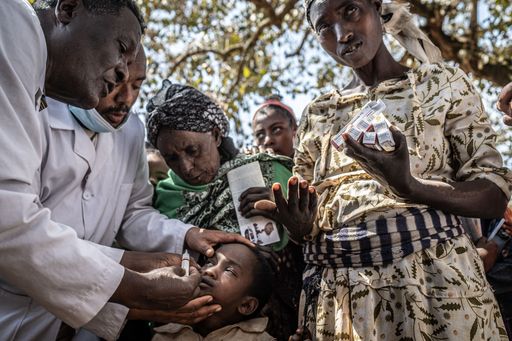Dr Mamadou Diop will never forget the sight of a grandmother in her sixties entering his clinic one day, clutching her grandson's arm as she navigated each step.
Her eyelids had turned inward, eyelashes scraping against her corneas with every blink.
"That moment when she told me, 'I can no longer see my grandchildren's faces', has stayed with me. Trachoma doesn't just take away vision; it strips you of dignity, independence and the joy of living," says Dr Diop, an ophthalmologist based in Senegal's rural Matam region.
Such heartbreaking stories about trachoma, a bacterial infection that causes irreversible blindness, used to be commonplace in Senegal for decades. Thankfully, the page has turned.
On July 15, the World Health Organisation (WHO) officially validated that Senegal had eradicated trachoma as a public health problem, marking the end of what had been a scourge plaguing the West African nation since the early 1900s.
Senegal joins 24 other countries, including Benin, Ghana, Mali and Mauritania, that have eliminated trachoma.
Disease hotspots
Trachoma had struck roots in Senegal by the time surveys in the 1980s and 1990s confirmed it as the leading cause of preventable blindness.
The disease was endemic in remote, underserved communities where even basic necessities were hard to come by.
"This was a disease of poverty," explains Dr Ibrahima Sy, Senegal's minister of health and social action. "It thrived where clean water was scarce, enforcing hygiene was difficult, and healthcare was out of reach."
The turning point came in 1998, when Senegal joined the WHO Alliance for the Global Elimination of Trachoma.
The country launched a systematic campaign built around WHO's proven "SAFE" strategy, entailing surgery for advanced cases, antibiotics to halt transmission, promotion of facial cleanliness, and environmental improvements, including access to clean water and sanitation.

Door-to-door drive
Over two decades, doctors in Senegal treated 2.8 million people across 24 districts, performed thousands of sight-saving surgeries, and distributed the antibiotic azithromycin through the International Trachoma Initiative.
Health workers like Sister Marie Ndiaye, a nurse in the Kédougou region, were the foot soldiers of this hard-fought battle to take healthcare and trachoma awareness to every household.
"We went door-to-door, explaining how washing one's face regularly and using clean water could save sight," she tells TRT Afrika. "At first, some resisted. But when they saw their neighbours regain vision after surgery, trust in us grew."
Children stopped missing school due to eye infections. Adults could work and provide for their families without the spectre of impending blindness hanging over them.
"This is about restoring the future," says Dr Jean-Marie Vianny Yameogo, WHO's representative in Senegal. "Trachoma's shadow has lifted because of the relentless efforts of communities, health workers, and leaders who refused to accept it as inevitable."
Global challenge
While Senegal celebrates a milestone – the country had previously eliminated dracunculiasis, or Guinea-worm disease – the global fight to conquer trachoma is still far from won.
The disease threatens 103 million people across 32 countries, with 90% of cases concentrated in Africa.
The good news is that since 2014, the number of people requiring treatment in Africa has dropped by 51% from 189 million to 93 million.
"As we celebrate our victory against trachoma, 21 years after defeating dracunculiasis, it proves that with political will, community engagement and strong partnerships, we can eliminate neglected tropical diseases," says health minister Dr Sy.

WHO director-general Dr Tedros Adhanom Ghebreyesus sees Senegal's achievement as a template for others to follow. "It shows that with sustained effort, even ancient diseases can be conquered."
Senegal has now shifted focus to other public health threats like sleeping sickness, a parasitic disease transmitted by the tsetse fly, and river blindness, which is caused by the parasitic worm Onchocerca volvulus.
For Dr Diop, memories of the grandmother who could no longer see her grandchildren's faces bring a touch of regret.
"I wish my patient could have seen this day," he tells TRT Afrika. "But her suffering was not in vain. Because of her, and thousands like her, Senegal is now free from trachoma. That is a legacy worth celebrating."



















